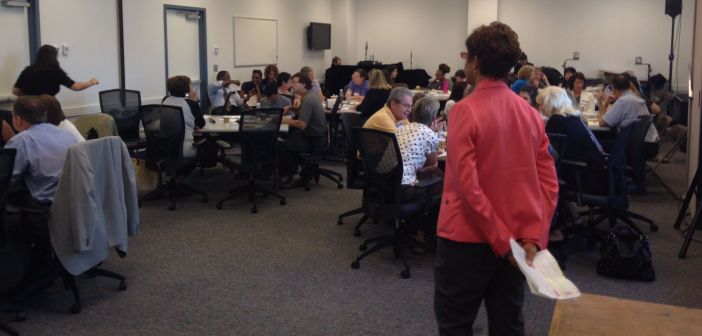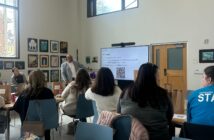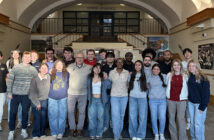The Cornell Interactive Theater Ensemble returned to Lehigh for a series of diversity, inclusion and engagement workshops that aimed to engage the campus community in a movement toward diversity and inclusiveness education.
The workshops are a collaboration by Board of Trustees Chair Brad Scheler, Interim President Kevin Clayton, Provost Pat Farrell and Vice President Patricia Johnson, and are a step toward advancing inclusiveness at Lehigh and moving forward as a unit and institution, said Vice Provost for Academic Diversity Henry Odi.
“These efforts are not about any one person or group, but is about what is best for Lehigh University and making it a greater institution in the country,” Odi said. “We have embarked on a grass root strategy for broader engagement across the university.”
CITE’s purpose as a resource for Lehigh’s employees is to facilitate dialogue around issues of diversity and exclusion, particularly those that may develop into points of conflict in the workplace. The session was not limited to addressing diversity in any single form. Instead, it contextualized instances of age-, sexual orientation-, political leanings- and sex-based marginalization.
Members of the CITE group took to the stage to take on a series of roles – each depicting a unique experience from a diverse individual met with said issues in their respective work environments.
Immediately following the skits, the audience was invited to consider which characters they most related to, if any. The performances, though not based on a particular academic setting, reflected many of the issues brought to light in discussions by Lehigh faculty and staff.
Consultant and facilitator of the CITE group, Vivian Relta, encouraged the audience of faculty, staff and students to listen for the complexity of the stories being told, and not only to distinguish the similarities between them, but also that which makes them different.
“Our mission is to give voice to a variety of points of view within the human experience in order to facilitate a shift in culture,” Relta said. “And that shift is toward greater trust, honesty, respect and dignity for all people.”
To open the session, a scenario that tackled ageism in the workplace depicted Larry, a long-time employee who expressed concern that he was passed over for training opportunities because he was nearing retirement age.
“I’m an active member of my workplace community, and just because I’ve been here a long time doesn’t mean I’m not open or interested in finding a new way of doing things,” actor Dane Cruz said in his portrayal of Larry. “I want to be a part of the community. I want to be included, until I decide it’s time to retire.”
Retirement pressures in the workplace were addressed by the audience, with staff members in the College of Education weighing in on the prevalence with which they see considerations of age and retirement.
Denise Campion, who works in Library & Technology Services, noted that upon her arrival to Lehigh in 2008, she was told that 30 percent of the faculty and staff within her department would be retired within the next 10 years. The loss of such institutional knowledge all at once is huge, she said.
The workshop also covered sexism in the workplace, depicting a woman named Linda whose methods of communication had been criticized by management.
Linda, portrayed by CITE’s Erica Steinhagen, had just been confronted about her communication style and told that her approach was abrupt, rude, impatient and demeaning.
“I really think that the truth is that they have an issue because I’m a woman,” said Steinhagen in her role, also adding that her “edge” was a behavior adopted by the way that things get done at her workplace.
The skit continued on, saying that when Linda’s male boss communicated in the same manner, he was perceived as direct and honest. Contrarily, Linda’s communication behavior classified her as “a bitch” and impatient.
The audience actively responded, with female faculty members sharing their experiences with both gender roles in the workplace and the concept of diversity hires. The latter was also covered in a skit, with CITE’s Jum Warritay taking on the role of Chris, a new manager who contemplates whether being a female and a woman of color influenced her getting the job.
Campion, who was the only female candidate for the position she now holds, said that she had wondered at the time of her hire whether she had been given the position because she is a woman.
M. Virginia McSwain, the sole female professor in Lehigh’s physics department, shared an opposite experience in which she was insulted by a department chair. Because she is constantly surrounded by male colleagues and primarily male students, the department necessitates an aggressive and assertive stance at all times, she said.
McSwain said she has received criticism for refusing to adopt a nurturing, motherly role.
“They are not treating me at the same standard that my male colleagues are being treated with,” she said, referencing a past experience in which she had to provide written documentation to prove that certain students, and not her, were problematic.
“Then I suggested to my chair, ‘Hey, maybe you’re stereotyping me because I’m a woman, and so maybe you should think about that,” she said.
According to McSwain, everything has improved a lot since that conversation.
Overall, CITE’s presentation was met with enthusiasm and participation, accomplishing the workshop’s goal of educating the audience on diversity and inclusivity in an engaging and interactive manner.
Prior to watching the performances, Karla Morales, a staff member in Advancement Services, said that she did not know what to expect but had an open mind.
“Isn’t one of the lessons?” Morales asked, “That if we come bearing fewer preconceptions we’ll be more open?”






Comment policy
Comments posted to The Brown and White website are reviewed by a moderator before being approved. Incendiary speech or harassing language, including comments targeted at individuals, may be deemed unacceptable and not published. Spam and other soliciting will also be declined.
The Brown and White also reserves the right to not publish entirely anonymous comments.